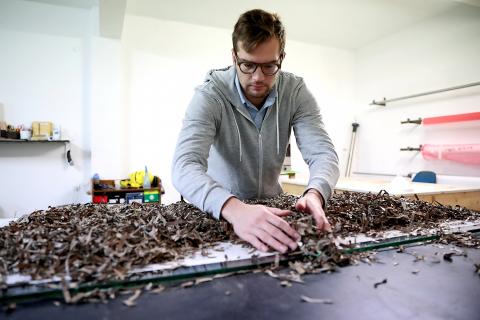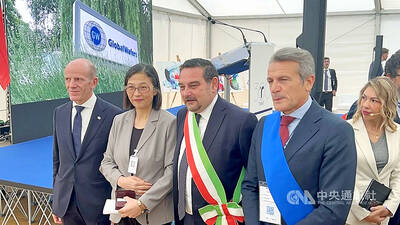Greek student Stavros Tsompanidis was walking on a beach when he saw a business idea in the piles of dried-up seagrass.
He decided to recycle it to make iPhone cases, sunglasses and gift boxes.
Four years on, his start-up, PHEE IKE, sells its products across Greece and abroad. He represents a change in mindset among young Greeks who are turning to entrepreneurship as a result of the financial crisis.

Photo: Reuters
“If we don’t act, in the next five years we’ll be saying the same things: that Greece isn’t going well, that there are no jobs ... that we have a new program by the International Monetary Fund and European Union to support us,” the 25-year-old said.
Greek start-ups are mushrooming in a financial crisis that started in 2008. The economy is only just recovering. It shrank by a quarter and cut off traditional routes to employment — jobs in government and family businesses.
Start-ups were virtually unheard of a decade ago, but they are now creating jobs and offering some hope that Greece can reverse an exodus of its highly skilled youth.
Greece has no official start-ups register, but several private databases show they number between about 600 and 1,100. The earliest count of start-ups, made in 2010 by non-profit advisory Endeavour Greece, stood at just 16.
AngelList, an online database, put the current number at 600, while audit firm Grant Thornton LLP found 1,127 in a report last year. Greek venture capital firm Marathon VC, established only last year, counts about 1,000 tech start-ups in its database.
Venture capital in the sector is growing.
A European Investment Fund (EIF) initiative, supported by private investors, is expected to pump about 400 million euros (US$479.48 million) into Greek start-ups and other small businesses over the next five years.
In 2008, when George Tziralis, a partner at Marathon VC, launched a networking event for start-ups, about 12 people turned up. Now, 200 to 300 people attend each month and three to five new start-ups are presented.
“Ten years ago there was almost nothing,” Tziralis said. “Today we’re seeing something much more mature, which we believe to be the tip of the iceberg.”
Marathon VC has made five investments so far, has three more in the pipeline and Tziralis believes it can allocate its entire 32 million euro fund in under a year.
Tourism and shipping, Greece’s two main industries, are driving a tentative economic recovery.
The structure of the economy could change if the number of start-ups continues to grow, economists have said.
During the crisis, thousands of firms shut and unemployment peaked at 27.9 percent, with six in 10 young jobseekers out of work.
About 223,000 Greeks aged 25 to 39 emigrated in 2008 to 2013 to richer countries, central bank data show.
The austerity that was a condition of repeated international financial bailouts deepened the depression. Those who stayed in Greece had to innovate to survive.
“The crisis created necessity entrepreneurship,” Hellenic Startups Association vice chairman Panagiotis Zamanis said.
National Bank of Greece SA said the tech start-up sector is showing particular promise, even though it only has a total valuation of about 300 million euros.
“The Greek ecosystem of tech start-ups is still in its infancy, though it already shows signs of high growth potential,” it said in a report.
Three engineers founded Ex Machina, a software start-up offering predictive analytics for weather-sensitive industries in the summer of 2015, when capital controls were imposed.
“We wanted to take more risk because we believed that — the way things were — it couldn’t get worse,” said one of the founders, 38-year-old Manolis Nikiforakis.
He was speaking in Ex Machina’s Athens office in Greek lender Eurobank Ergasias SA’s start-up hub, EGG, where cubicle walls are covered in business plans and Post-it notes.
Ex Machina has Greece’s biggest gas supplier among its customers and is in talks for funding to expand abroad.
The owners of Ex Machina and other start-ups said they have succeeded, despite the constraints of Greece’s business environment.
Red tape, high taxes and funding constraints are holding back entrepreneurs, they said.
Greece ranks 87th out of 137 countries in the World Economic Forum’s Global Competitiveness Index, behind Tajikistan and Ukraine. Taxation, which has climbed as a result of austerity, and crippling bureaucracy are cited among hurdles to business.
It took Ex Machina three months to open a bank account, during which clients could not pay for its services.
Funding was scarce as Greek investors were used to more traditional sectors such as restaurants and tourism. Ex Machina and PHEE at first relied on savings, grants and winning start-up competitions.
The Greek entrepreneurs behind taxi-hailing app Beat, bought last year by Germany’s Daimler AG, set up in London because of the more flexible legal framework and lower start-up costs.
“I tried to see with my accountant how long it would take to open the company in Greece, to open a bank account and then get the money,” Beat founder Nikos Drandakis told the Greek parliament in March. “We were talking about more than one to two months... We opened the company in England in one day.”
The Greek government is considering introducing tax breaks for start-ups this summer.
“The economy’s growth depends on how well these businesses fair in the next 10 years,” Eurobank deputy chief executive officer Stavros Ioannou said. “We have to help them.”
Last month, Athens teamed up with the EIF to launch Equifund, a 400 million euro fund aimed at start-ups and other small companies. About one-quarter of the money is to be from private investors, the rest would be public funds.
The EIF said in an e-mailed statement that it hopes to fight “brain drain, maybe even reversing it into brain gain.”
The money should focus on helping start-ups expand beyond the Greek market, said Costas Andripoulos, professor of innovation and entrepreneurship at London’s Cass Business School.
Workable, a start-up whose software aims to make hiring easier, was launched in Athens in 2012. It now has offices in London and Boston, and 180 staff, most of whom are in Greece.
It has raised US$32 million from investors and counts Porsche AG, Ryanair Ltd and Marks & Spencer Group PLC among its 6,000 customers.
Workable’s Nikos Moraitakis quit a job in Dubai to set up the firm in Athens, despite Greece’s problems.
“Successful [start-ups] are often created in recession,” he said.

RECYCLE: Taiwan would aid manufacturers in refining rare earths from discarded appliances, which would fit the nation’s circular economy goals, minister Kung said Taiwan would work with the US and Japan on a proposed cooperation initiative in response to Beijing’s newly announced rare earth export curbs, Minister of Economic Affairs Kung Ming-hsin (龔明鑫) said yesterday. China last week announced new restrictions requiring companies to obtain export licenses if their products contain more than 0.1 percent of Chinese-origin rare earths by value. US Secretary of the Treasury Scott Bessent on Wednesday responded by saying that Beijing was “unreliable” in its rare earths exports, adding that the US would “neither be commanded, nor controlled” by China, several media outlets reported. Japanese Minister of Finance Katsunobu Kato yesterday also

‘DRAMATIC AND POSITIVE’: AI growth would be better than it previously forecast and would stay robust even if the Chinese market became inaccessible for customers, it said Taiwan Semiconductor Manufacturing Co (TSMC, 台積電) yesterday raised its full-year revenue growth outlook after posting record profit for last quarter, despite growing market concern about an artificial intelligence (AI) bubble. The company said it expects revenue to expand about 35 percent year-on-year, driven mainly by faster-than-expected demand for leading-edge chips for AI applications. The world’s biggest contract chipmaker in July projected that revenue this year would expand about 30 percent in US dollar terms. The company also slightly hiked its capital expenditure for this year to US$40 billion to US$42 billion, compared with US$38 billion to US$42 billion it set previously. “AI demand actually

Jensen Huang (黃仁勳), founder and CEO of US-based artificial intelligence chip designer Nvidia Corp and Taiwan Semiconductor Manufacturing Co (TSMC, 台積電) on Friday celebrated the first Nvidia Blackwell wafer produced on US soil. Huang visited TSMC’s advanced wafer fab in the US state of Arizona and joined the Taiwanese chipmaker’s executives to witness the efforts to “build the infrastructure that powers the world’s AI factories, right here in America,” Nvidia said in a statement. At the event, Huang joined Y.L. Wang (王英郎), vice president of operations at TSMC, in signing their names on the Blackwell wafer to

Taiwan-based GlobalWafers Co., the world’s third largest silicon wafer supplier, on Wednesday opened a 12-inch silicon wafer plant in Novara, northern Italy - the country’s most advanced silicon wafer facility to date. The new plant, coded “Fab300,” was launched by GlobalWafers’ Italian subsidiary MEMC Electronics Materials S.p.A at a ceremony attended by Taiwan’s representative to Italy Vincent Tsai (蔡允中), MEMC President Marco Sciamanna and Novara Mayor Alessandro Canelli. GlobalWafers Chairwoman Doris Hsu (徐秀蘭) said the investment marked a milestone in the company’s expansion in Europe, adding that the Novara plant will be powered entirely by renewable energy - a reflection of its